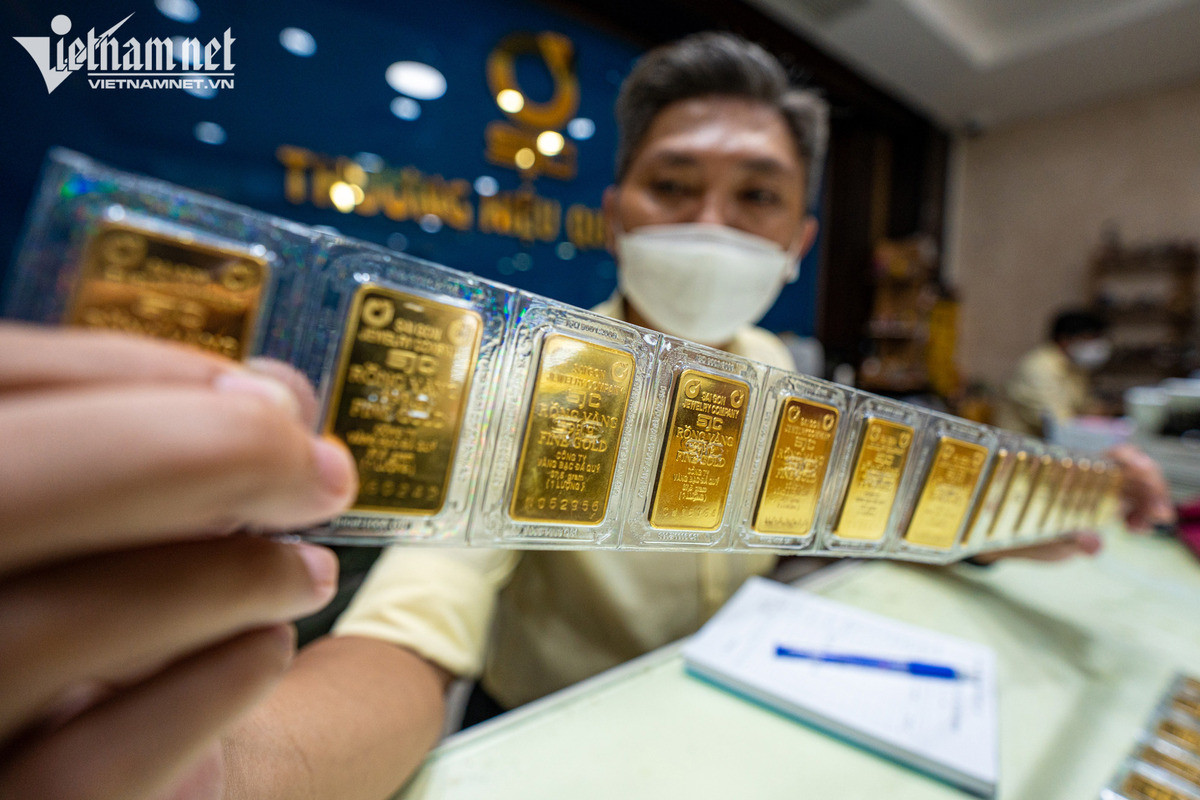
Many economists have repeatedly called on the State Bank of Vietnam (SBV) to remove the state monopoly in gold production and SJC gold brand.
At a meeting of the National Advisory Council for Fiscal and Monetary Policies recently, experts stressed that it is necessary to remove the state monopoly and allow some goldsmith companies to produce bullion gold if they satisfy certain requirements.
However, to date, no solution has been finalized. Meanwhile, domestic gold prices keep fluctuating.
On April 4, when world gold prices broke all records and exceeded the peak of $2,300 per ounce, domestic 9999 prices also soared, surpassing the VND72 million per tael threshold. SJC gold nearly hit VND82 million per tael peak, but later dropped to VND81 million.
Huynh Trung Khanh, deputy chair of the Vietnam Gold Business Association and advisor to the World Gold Council to Vietnam, said that no solution can be more useful than removing the monopoly and letting domestic prices go up and down based on supply and demand.
“If the state doesn’t increase supply, there won’t be any solution to narrow the gap between domestic and international prices,” Khanh said.
“This is a matter of supply and demand. Because of the monopoly, supply is stuck, and if the problem cannot be solved, the price gap will be even wider,” he continued. “The gold market performance over the last 10 years can prove this. No administrative command will help make the price gap shrink."
Meanwhile, Ngo Tri Long, a respected economist, told VietNamNet that many things need to be done to stabilize domestic prices, not just the monopoly removal.
“I know some analysts believe that gold fever can be reduced if the state increases imports, or authorizes some companies to import gold. But it will be extremely dangerous. If we do this, we will facilitate the supply of physical gold. In the world, in addition to gold in kind, there is also gold in account,” he said.
He believes that the higher gold supply is, the more "goldenization" will be serious, so it is necessary to apply measures at the same time.
“If the state imports gold, it will have to use foreign currencies. Higher gold supply will lead to higher 'goldenization'. Amending Decree 21 will not be enough, as it needs to be replaced,” Long said.
Converting physical to derivative gold
Long believes that in ideal conditions, the gold market needs to be regulated under the principle of supply and demand. In order to restrict "goldenization and dollarization", Vietnam needs to take action for a healthy gold market with limited gold speculation.
“The State Bank of Vietnam should only focus on its function of managing the gold market by setting policies and regulating forex reserves in gold in accordance with the Ordinance on Foreign Exchange, the Law on State Bank and the Law on Credit Institutions. It must not become a producer and trader, and it must not operate the gold market with administrative commands. It also must not intervene in gold companies’ business,” Long said.
The enterprises which can satisfy requirements to produce and trade gold need to be allowed to operate under market rules. The State should only control gold title, weight and labels based on enterprises’ registrations. There must be many different gold brands instead of one exclusive brand.
He said that it is taboo to set up too many administrative procedures, or called ‘sub-licenses’ in Vietnam, because this will cause difficulties for enterprises.
In principle, the Vietnamese gold market must communicate with the world market and the current price gap must be erased by market solutions. Once the prices are determined by supply and demand, import and export of gold needs to be liberalized.
“It is necessary to gradually shift from a physical gold market into a market with different gold derivatives, thus giving enterprises and investors more tools to prevent risks and integrate into the world, as well as access common financial products in the international market."
He also suggested shifting from physical gold transactions to transactions of other gold products, such as gold certificates and derivatives at a concentrated gold trading center.
Manh Ha